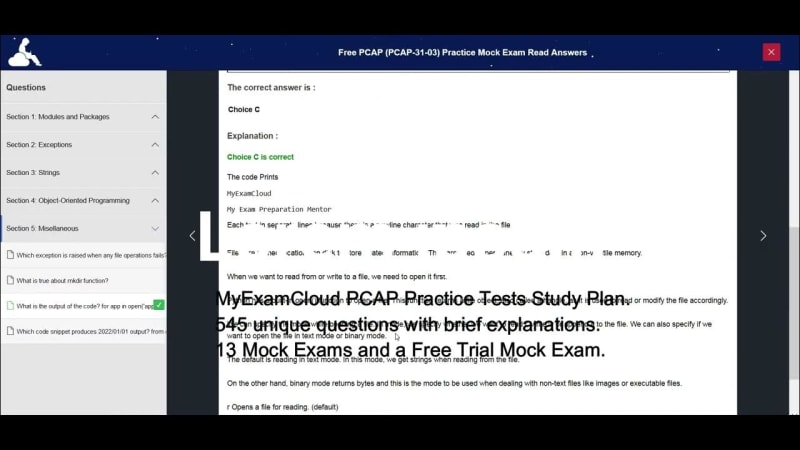Introduction to the PCAP Certification and Its Growing Popularity
Python has become one of the most in-demand programming languages globally, with its easy-to-use interface and diverse range of applications. As the demand for Python skills continues to increase, many developers are opting for certification programs to validate their expertise and stand out in a competitive job market. Among these certifications, the PCAP™ – Certified Associate Python Programmer is gaining popularity among both aspiring and experienced Python developers.
Exploring the Significance of the PCAP™ Certification for Python Developers
1. Validates Advanced Python Skills and Knowledge
The PCAP™ certification is designed to test the knowledge and proficiency of individuals in advanced areas of Python, such as modules and packages, string processing, exception handling, and object-oriented programming. By passing the PCAP™ exam, developers can demonstrate their understanding of these crucial concepts, showcasing their ability to handle complex coding tasks in Python.
2. Sets Candidates Apart in a Competitive Job Market
With the increasing popularity of Python, the job market for Python developers has become highly competitive. Having the PCAP™ certification listed on their resume can give candidates an advantage over others, as it indicates that they have taken the time to refine their skills and have the necessary expertise to tackle advanced coding challenges in Python. This is particularly beneficial for junior-level developers seeking their first job and experienced professionals looking to advance in their careers.
3. Essential for Building a Career in Data Science and Machine Learning
Python is widely used in data science and machine learning, making the PCAP™ certification a valuable asset for aspiring data scientists and machine learning engineers. The exam covers key concepts and techniques used in these fields, making it an excellent starting point for individuals looking to build a career in these rapidly growing and lucrative industries.
4. Provides a Strong Foundation for Specialization
The Certified Associate Python Programmer certification acts as a stepping stone for more advanced certifications offered by the Python Institute, such as the PCPP1™ and PCPP2™. These specializations focus on specialized areas like web development, network programming, and software development. By obtaining the PCAP™ certification, professionals can establish a solid foundation for further studies and prepare themselves for more challenging and specialized certifications, expanding their knowledge and career opportunities.
5. Boosts Confidence and Encourages Self-Improvement
Preparing for the PCAP™ Certification Exam: A Comprehensive Guide and Study Plan
Breaking Down the PCAP Exam Preparation Study Plan
The PCAP™ certification covers a wide range of topics, making it crucial for candidates to have a strong command of each area. Dividing the study plan into four phases can be beneficial for both fresher and experienced Python developers.
Phase 1: Building a Strong Foundation and Gathering Study Resources (Week 1-2)
The first phase of PCAP™ exam preparation involves understanding the entire syllabus and building a solid foundation for all the topics covered in the exam.
Section 1: Modules and Packages
Section 2: Exceptions
Section 3: Strings
Section 4: Object-Oriented Programming
Section 5: Miscellaneous
Phase 2: Focusing on Each Topic in Detail (Week 3-6)
The second phase requires candidates to focus on each topic of the exam in detail. It is critical to understand any language changes and use relevant study materials, such as OpenEDG Python Institute tutorials and MyExamCloud AI. Note-taking can be beneficial in retaining important concepts, such as forward and reverse indexing in lists.
Phase 3: Regular Revision and Practice (Week 7-9)
Regular revision and practice are crucial as the exam date approaches. Professionals can take objective-wise tests and work on improving their weaker areas during this phase.
Phase 4: Attempting Mock Tests and Analyzing Performance (Week 10)
In the final weeks leading up to the exam, candidates should focus on attempting mock tests and analyzing their performance. Taking full-length mock exams can help assess readiness for the final exam.
Exploring MyExamCloud's Study Plan for PCAP™ Certification
MyExamCloud offers a comprehensive study plan for PCAP™ certification preparation, including PCAP practice tests, mock questions, full-length mock exams, and access to course content on a mobile app or web browser. With over 545 questions, candidates can practice and improve their skills in specific exam topics and track their progress through a customizable study plan.
Conclusion
The PCAP™ certification is a valuable credential for Python professionals, and proper preparation is critical for success in the exam. By following the daily schedule and 10-week study plan outlined in this guide and utilizing MyExamCloud's study plan, candidates can ensure thorough coverage of exam objectives and increase their confidence for the final exam. Don't wait any longer, start your PCAP™ certification preparation journey today!








Top comments (0)